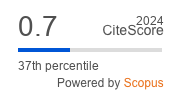The Role of Interleukine-33 in Inflammatory Bowel Disease
Keywords:
Inflammatory bowel disease,, IL-33, Ulcerative colitis.Abstract
The inflammatory bowel disease (IBD), Crohn’s disease (CD) and ulcerative colitis (UC) are heterogenous chronic inflammatory disorders of the gastrointestinal tract. The most widely accepted etiopathogenic hypothesis for these disorders suggests an immune mediated process.
Objective: This study was performed to evaluate the role of interleukine-33 in pathogenesis of inflammatory bowel disease and to correlate their levels with the disease activity and/or severity.
Methods: Fifty five subjects with inflammatory bowel disease (41 ulcerative colitis patients and 14 Crohn’s disease patients) their ages range from 16-65 years and 25 apparently healthy volunteers their ages and sexes were matched with the patients were participated in this study. Blood samples were collected from all patients and controls to assess serum concentrations of interleukine-33 by enzyme-linked immune-sorbent assay.
Results: The present data revealed that there was significant elevation (P<0.05) in serum levels of interleukine-33 in ulcerative colitis and Crohn’s disease patients as compared with control group. Concerning the correlation between serum levels of interleukine-33 with clinical parameters, the current study revealed a positive correlation between serum interleukine -33 with the disease activity in ulcerative colitis (P=0.41). As regards to disease location, interleukine-33 was significantly higher (P<0.001) in ulcerative colitis patients with pan-colitis (E3) as compared to those patients with proctitis disease (E1) and CD of the colon (E2).
Conclusion: This study indicated that interleukine-33 might be a crucial mediator in the pathogenesis of inflammatory bowel disease.













